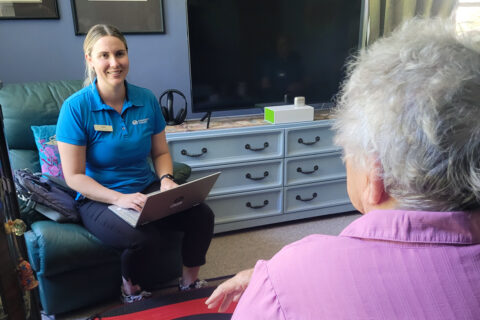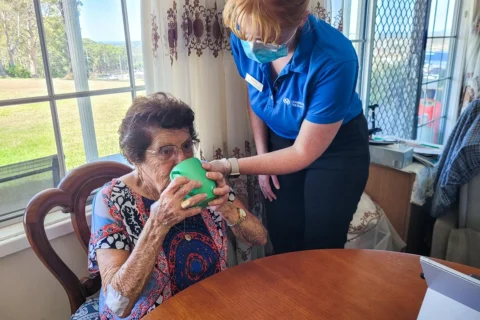Functional capacity assessments, commonly abbreviated as FCA, are comprehensive assessments completed by allied health professionals. They are commonly completed for a person living with a disability receiving support via the National Disability Insurance Scheme (NDIS), however are common in other funding schemes as well.
At Community Therapy, our allied health professionals including our Occupational Therapists are experienced in completing functional capacity assessments for adults and children living with a range of disabilities.

What is a functional capacity assessment?
A Functional Capacity Assessment (FCA) is a comprehensive evaluation that assesses an individual’s ability to perform activities of daily living (ADLs). It encompasses a thorough examination of physical, cognitive, and emotional strengths and limitations to provide a holistic understanding of an individual’s functional capabilities. This information is then used to develop interventions and support plans tailored to an individual’s specific needs to help improve their functional capacity and ability to achieve their goals.
Who performs a functional capacity assessment?
FCAs are typically conducted by qualified healthcare professionals, such as:
- Occupational Therapists complete most FCAs due to their focus on assessing an individual’s ability to perform all areas of their daily activities such as personal hygiene, dressing, cooking, community access, socialisation, hobbies and work.
- Physiotherapists specialise in assessing an individual’s physical abilities, including mobility, balance, and strength and often work alongside an Occupational Therapist to provide a more in depth assessment of these areas if required.
- Speech Pathologists assess communication, swallowing and cognitive components of an individual’s function and work collaboratively with other health professionals, such as Dietitians, where required.
A Functional Capacity Assessment is best completed in the client’s home environment. This allows the occupational therapist or health professional to observe the client in their natural surroundings and assess their daily activities. However, in some cases where clinically appropriate, FCAs may also be completed remotely via telehealth.
Depending on a client’s needs, specialists like Psychologists or Neurologists may also be involved in their care and evidence for use in their FCA report.
What outcome measures or assessments are used in a functional capacity assessment?
During the assessment, the OT will observe a client performing everyday tasks like:
- Personal hygiene: This includes showering, dressing, and grooming.
- Meal preparation: The OT will assess an individual’s ability to prepare meals independently.
- Mobility: The therapist will observe how a client moves around their home and transfers between surfaces.
The Importance of Details
The OT will use a standardised template to document the assessment. This template includes a client’s age, medical conditions, and details about how they perform each activity. For instance, the OT might note if you require assistance with meal preparation, getting changed and other Activities of Daily Living (ADLs).
Understanding Your Background
Before the assessment, the OT will gather information about a client’s medical history, communication skills, and daily routines. This includes details about:
- Medical background: This helps the OT understand any limitations related to an individual’s health.
- Communication skills: The OT needs to ensure clear communication throughout the assessment.
- Assistive therapies: Is the client currently receiving any therapies that might impact their functional abilities?
- Education and work: This helps the OT understand the client’s overall lifestyle and needs.
- Leisure interests and sleep patterns: These factors can influence a client’s overall well-being and ability to manage daily tasks.
What the Assessment Covers
The functional capacity assessment considers a wide range of daily activities, including:
- Self-care: This includes toileting, bathing, dressing, and grooming.
- Mobility: The OT will assess a client’s ability to move around safely within their home and navigate transfers.
- Home management: This includes tasks like laundry, cleaning, and managing finances.
- Social participation: The OT might assess a client’s ability to use the phone, travel independently, and shop for groceries.
Beyond the Checklist
The assessment goes beyond simply ticking boxes. The OT will ask questions to understand an individual’s experience with each activity. They may also conduct practical tasks to observe their performance firsthand.
Following the assessment, the OT will analyse the data and make recommendations. This might include ongoing therapy, assistive technology, or referrals to other healthcare professionals.
By understanding an individual’s functional capacity at home, occupational therapists can develop a personalised plan to help them regain independence and improve their overall well-being.
What Comes Next?
Our Functional Capacity Assessment (FCA) reports are designed to be clear, informative, and actionable. Here’s what you can expect:
- A Snapshot Functional Abilities: The report will provide a comprehensive picture of how an individual performs everyday tasks in their home environment.
- Identification of Limitations: We’ll clearly outline any challenges an individual experiences with daily activities.
- Data-Driven Recommendations: Based on the assessment, the report will offer specific strategies to help an individual overcome limitations and increase their independence, as well as use standardised measures to show comparison with age-related normative values.
- A Roadmap for Future Care: The report will recommend a personalised care plan to address an individual’s current and anticipated needs.
Once finalised, the FCA report will be provided to both the client and others involved in their care whom they have consented to sharing the document. This ensures everyone involved has a clear picture of the client’s functional capacity and can work together to develop the best course of action for their continued well-being, as well as assist with creating a suitable NDIS funding budget for your needs.
Check out our adult OT services pages to find out more about the services our occupational therapists provide.
Want to learn more?
Have any questions? Our friendly team is happy to assist. Simply give us a call at 1300 031 935 or contact us.
References:
- Occupational Therapy Australia https://otaus.com.au/about
- Australian Physiotherapy Association. (2023). What is a functional capacity evaluation? Retrieved from https://australian.physio/


 November 27, 2024
November 27, 2024

